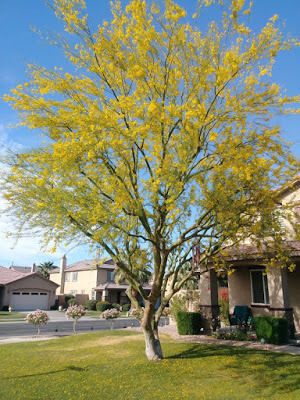Home Owner's Associations ... Being a Director, and finally knowing when to walkaway ...

For the last four years of my life, I've been involved as a Director in my community in North Indio. Tonight, was my last official night of business. They held an election, I wasn't on the ballot, but I was anxiously awaiting the results like other homeowners, hoping they would make the minimum number of votes received, or quorum, so the election could be ratified – and I could be officially relieved of duty.
I know that doesn't sound like what you'd expect to hear, but after having served for almost four years, I felt as if I had volunteered enough of my free time, handled enough late night phone calls, politely answered my door to hear out angry neighbors and bear the brunt of someone's ire on social media or at social gatherings. I've been threatened more times than I've been thanked, but the threats were always hollow and the the thanks were always heartfelt and even at times tearful. I negotiated the best I could for all homeowners with other Directors and Legal Counsel, but always held to the letter of the law in all matters and sought advice from those I served with.
HOA Directors are bound by the Davis-Sterling Act to preform their fiduciary duty and protect the assets and property values of the community, to make no decision that would negatively impact the community insurance policy and make decisions that have undergone due diligence and well considered. The largest part of any Director's responsibilities is to uphold the communities Covenants, Codes & Restrictions, it's Bi-laws and its basic Rules and Regulations. These vary from place to place and can be the source of most of the drama and political fallout. Directors cannot be paid, nor be involved in any form of self-dealing or make decisions that would benefit their friends or family directly. It's pretty straight forward. Some people get this, some don't. It's not uncommon, but most of the time Directors who volunteer to serve on these types of boards, do so in good faith with the sole intent of serving the community honestly … and as always … some only come to serve themselves. Most of the time it's quickly obvious, but sometimes it isn't.
That said, HOA's are usually hated or reviled by most people and often misunderstood in their purpose. It's not easy living under someone else's set of rules, especially as a full grown adult.
I've always said to homeowners that “Everyone always loves living in an HOA until they get a ticket for a rule infraction, or they do something they don't have permission to do on their property. Then – the HOA is the bad guy. Count on it.”
They're hated by people who live inside of their gates and who just cannot abide by very simple and very basic rules. Don't park on the street without a pass between midnight and six am, don't leave your trash cans on the curb for days on end, make sure you keep your front yard looking decent and your plants and grass watered. And above all – shockingly – pay your monthly assessment that covers whatever amenities your community has, which includes the perks of landscaping security, financial stability, management and so forth. You know whatever that amount is when you buy the place, whatever it is, be it $69 or $269. You even sign a document stating this in your escrow packet. Some communities have monthly HOA dues up around $800. Those developments however, cater to a different subset of people and those owners are treated more like customers at a five star hotel rather than just everyday mortgage payers. And understandably so. This is America, after all. You get what you pay for in the land of silk and money.
Living by basic rules is easy for most people who are just happy to get on with their lives and business, carry on even-keeled and be kind to all adjacent neighbors, which isn't that difficult. Most of us do this without thinking. It's like breathing, or doing laps in the pool and keeping your heart rate at a steady pace the whole way from wall to wall. It's really not hard. Some people, however, make it their life's work to look for fault and unhappiness as if there's a reward for it. These are the people you often read about in news articles about HOA disputes. These are the folks that will push a simple issue all the way in front of a judge or into mediation and often with little to nothing more than a perceived slight, bruised ego or an inability to accept a basic limit. And of course, sometimes this happens because that person is litigious and knows how to take advantage of an Associations weakness.
HOA's are also loathed by people who have never lived in an HOA and who don't grasp their benefit, regardless of how much they read on the subject. To truly understand HOA's and appreciate them, you have to live in one, and even moreso – serve on the Board of one. It's not to find out personal or financial business on your neighbors, but you do get a good example about how most of them will conduct themselves professionally. From retired CEO's to struggling janitors.
In 2014, I bought a beautiful home in the gated community Terra Lago in North Indio. The house sits on a quiet corner, has a large Palo Verde tree in the center of the large green grass yard and an abundance of bougainvilleas climbing up brick walls. There's multi-colored red, white and purple vinca flowers, little square green hedges, lavender bushes, iceberg roses and a long row of oleander trees that look like they've been hand-curated by Mr. Miyagi from the Karate Kid. I grew them from small plants in my kitchen over a year and then transferred them carefully outside. As a retired Marine who has seen combat, one of the best practices I've ever engaged in is gardening. The old saying 'It's better to be a warrior in the garden, than a gardener at war' has always rung true, especially for me.

The sun shines in Indio most days, the weather stays in the eighties almost year round and it's pleasant, quiet and all-around serene. Kids ride bikes and laugh in the park behind my house. Lino, the Ice Cream Man stops by every few days at my corner and says hello. We catch up on how our kids are doing in school and I do my best trying to speak Spanish to his dad, who is a true gentleman and does his best to make me laugh. In the summer, when it gets up around 115, people either stay inside or sit around their pools, sipping cold drinks watching the kids play and listening to music, podcasts or reading their books. It's almost idyllic. Even as an author who lives on modest means, my house has the refinements and happiness of someplace much more lavish.
Most people will tell you that there is no such place as “North Indio,” by the way and there's only Indio, and they would be correct. But in 2006, when development in Southern California was going at mach speed, large swaths of land north of the I-10 freeway, east of Palm Springs became developed at an unsustainable rate. All of this area was known, or informally referred to as North Indio, and the name stuck. When the market crashed, a lot of these homes became foreclosures. Many had just been built and never lived in. Builders had been financed to construct these homes with the money from out of town investors, mostly from Anaheim, San Diego and as far away as Canada. Some of the houses, like mine, were purchased in groups of eight, ten and fourteen. But, by the close of 2007, it didn't pan out that way. Not even close.
Lots of people lost everything during the crash and it was painful. I witnessed friends lose their savings, their 401ks, their new houses but mostly their good will towards others and the country slowly changed for the worse. People took just as much of a hit to their pride as they did their pocketbook. They felt lied to and betrayed. They blamed the Realtor's who sold them the houses and then the banks. Few took the blame shoulder first, acknowledging they had invested poorly, or spent beyond their means. Many today still speak about 2007 like there wasn't a soul alive that saw the crash coming, but we all know that just isn't true. Afterwards, the country, Coachella Valley included, spent many, many years of hard work climbing out of that hole. 'Toxic Assets' as they were then called from Wells Fargo and others, sat in North Indio communities for many years to come. The last toxic asset property in Terra Lago didn't sell until 2016. We celebrated when it sold at my house, not because I was on the board, but because it was directly beside me. The neighborhood kids played in the backyard for years and it had sat vacant for so long, they thought it was a haunted house.
I purchased my home for a steal at the tail-end of the economic market crash in 2014 for the all-time low of roughly $230K. We closed escrow on Saint Patrick's Day, and for an Irish kid like me, it was a good omen. I don't mention this to brag, because in California it's not a boast by any stretch of the imagination, but for 2700 sq feet, it was a steal. Now, you would be hard-pressed to build a house that big for $200k in California. But when I was interested in purchasing, my Realtor and other Realtor friends in Palm Desert, laughed at me and thought I had gone mad.
“North Indio? Are you crazy? That's gangland over there. Wild West, bud. Those communities are never going to get any better!” It sounded troubling.
My first Realtor refused to show me any homes in the community I had inquired about. He stated “You do know there's a Board Recall in that place, right? Homeowners' got together and raised about $20K to pay the legal costs to have that board removed. The Sheriff's were called and it was ugly. Nobody wants to buy in there and almost everyone wants to sell. Of all the places to live – that aint it.”
This was my introduction to where I live, my new HOA, and my neighbors. Terra Lago had the worst reputation of any community in North Indio and the Directors at the time were infamous and known valley-wide and talked about as if they were a pariah or mythical. And it got worse. The City of Indio considered the homeowners in my community a nuisance and wanted no part of any personal or written contact if it wasn't necessary. Homeowners had picketed out in front Indio City Hall on the sidewalk, mad about Mello Roos and it hit the evening news. This was a situation they couldn't fathom and it was at a breaking point.
For me, I'd lived in Santa Monica, Brentwood, Burbank and Hollywood and the City Fathers of those places had huge public outreach to make sure everyone was happy. Sometimes it wasn't, like during the O.J. Simpson trial for instance, but those times never lasted. In L.A., community meetings were always what they were supposed to be and the meaning of community was always stressed. Neighbors were the glue that held those places together. Of course there was always enough NIMBY threats to keep everyone together and hunkered down. But this wasn't the case here. This was like moving into a no man's land. When you have a community of all brand new neighbors, and they've come from all over the country. It would be foolish to believe that you would find a sense of community right off the bat, and it was true. It would take time. A lot of time.
When I eventually met my neighbors and spent weekends relaxing near a bar-b-que or the pool, the conversation would always turn to whatever the recalled Directors had engaged in or were still up to. Most of them were still active in the community, had even re-run for the board after being recalled and still maintained every shred of innocence they could muster in their own defense. And that's not out of the ordinary either. People still had to live here and be neighbors.
“What the hell happened that people had to have these guys recalled?” I asked my new neighbor.
The tone would always change with every person I asked and the story was always the same. That one person had their cars towed out of their driveway overnight, with no warning whatsoever while they were sleeping. That another person was cited and fined $2500 for having a metal salamander climbing up their brick wall on the front of their house. That one homeowner wasn't allowed to build an entry wall for his courtyard, but his neighbor three doors down who was best friends with the Board President was given permission. That one homeowner was taken to court, their house was liened and then foreclosed upon and they barred from entry for past fines which were all for landscaping violations. Another neighbor was actively being stalked by one of the Directors and it was getting worse over time.
“Come again?” was my usual response.
I was knocked back almost every single time I heard these stories and shown either the tickets, the letters or receipts of their financial impact. I couldn't figure out if it was that some people were bored and had too much time on their hands, or that they couldn't help themselves with even the most rudimentary amount of power. Feeling obligated to ticket every infraction from the most minor through the most egregious, and filtered through their interpretation of the governing documents didn't make it right. Even on the outside of the situation, these actions didn't add up.
Most of what I heard I couldn't believe, so I spent one full year talking to as many of the 523 homeowners who had been involved as I could. I started slowly and I eventually made my way through the bulk of anyone who knew anything. Being a writer, I was curious. I wanted to hear these stories directly from the mouths of the affected as well as the perpetrators no matter what was said, and of course I kept very detailed notes. It was a mixed bag of backgrounds from retired CEO's to single mom's working as school teachers for Desert Sand Unified, and the reception was as any might imagine. Almost textbook. Those that had been negatively affected or harshly treated were happy to talk to someone and tell their story. They felt betrayed or unfairly harassed. They often told their stories through tears and felt what was being done to them, wasn't being distributed equally to all people who were in clear violation, or if they were violating, others were never ticketed or bothered at all. Many had moved to the desert from colder climates to enjoy the good weather and regain vitality and better health and live in peace and that was never to be had or found after their run-ins with the HOA.
Those that were involved in any way as a perpetrator or in support of the perpetrators were hostile, overbearing, judgmental and on many levels dishonest, snide and overly suspicious. Often times it came down to just too much box wine and too little compassion. They were literally hunkered down into a small group trying to defend their actions and the actions of others. Most of those meetings were unpleasant and I used every fibre of my being to be open-minded and friendly. Sadly, the facts just didn't fit some of the stories they wanted to tell and playing the victim was almost prescribed by everyone in their circle.
Part of the problem is that when you move into an HOA you never expect your neighbors to use their positions of power to make life difficult for the people around them. Most of the court cases that have come to national attention have been exactly that. One case was a homeowner who wanted to install a flagpole on their property and were told 'No' by their Board. Being able to fly and display the US Flag is a federally protected right, and no HOA law, rule or guideline can ever be out of sync or seek to supersede County, State and Federal code or law. That is the first basic step. However, in the past. Board members erroneously thought they could impose their will on other owners, as long as they got away with it. But that changed with every new challenge and every setback. Now the courts have established these arguments and will no longer hear these disputes further.
On one level though, I could understand the plight of the perpetrators however. They weren't being evil as they saw it, they were just wanting to stand their ground. It was quite simple and their stories were also very similar to each other.
They had moved in from out of the area, usually from colder climates like Detroit, Canada, Seattle, the midwest. They had been courted to buy their home either by a Realtor or a Builder and informed that it was an upscale 55 and older community that didn't have the restrictions of a 55 and up, but had very few families, very few rentals, mostly retiree's and would continue to grow in that direction. This was a story they all repeated. And the worst part of it was – they were blatantly lied to. Someone painted a picture of what they knew the buyer wanted to hear in order to get them to move across country to the last civilized exit in Southern California.

The Developers had never planned it to be exclusively or even informally stocked with mostly 55 and older and retirees. Time would eventually fill those homes with families because the overall cost, or price tag of the homes were deflated by approximately 17% to accommodate for the Mello-Roos taxes – which most people had very little to no knowledge of going in. The price point and the crash made these homes extremely attractive to younger families and middle income earners.
Now it's 2018, as of writing this and fast forward a handful of years and a few hundred court cases and we've discovered that HOA's have (mostly) learned their lessons. Imposing unjust rules on homeowners was a bad business model. They would fine themselves sued and those owners who were wronged had to be paid through a legal settlement. And it's the homeowners, collectively, that foot the bill for that everytime. In some cases, the HOA's insurance will pick up the financial burden, but once again, they will then turn and just raise their rates on that community. Remember a Director's basic duties? To not make decisions that they know will unfavorably impact the insurance policy? Yeah, that's what that's about. Full stop. A good HOA attorney will steer most new Boards away from getting involved in the mud with any homeowner and avoiding all potential litigation. An association will stand their ground though when their case is clear and without any hiccups, so it would be unwise thinking they could be outmaneuvered. These days the courts understand them better and don't always see Associations as the overbearing institutions trying to railroad homeowners anymore. Thankfully, those days are over.
Most of the Directors in Terra Lago that served on the Boards in the early years have all moved on. Some have sold their homes and left the community. Some even stated that if they couldn't be President, they wouldn't live in Terra Lago and thus quickly packed their trash and moved on. A few had to be removed, leaving in public disgrace. A few got tired and resigned, and a few served long durations and left with appreciation. The good guys weren't always good and bad guys weren't always bad. It was never that simple.
Myself, I tried to be of service and operate in the background without much notice, or with as little as possible. When I first started, the majority of my neighbors all had strong positive feelings for me. Afterwards, a few got upset and took out whatever problems they had on me, thinking somehow I had brought them the unhappiness they created. And it is this one thing that keeps most people from doing the job.
I didn't like putting my name on anything and I fought as hard as could to do what was right. I argued against foolish propositions that came from other Directors, Management and sometimes even a few homeowners. There were propositions to landscape and maintain property the Association didn't own or have water rights or access to. When I suggested that this information be made public, I was told that “Homeowner's don't have a right to know.” Well, I made it public. I fought against streets having their curbs being arbitrarily painted into red zones for permanent no-parking and I fought the loudest against the HOA getting involved in trying to impose Garage Inspections for anyone asking to overnight park on the street. These all screamed liability and losing litigation which kept me up awake at night not understanding why these battles were even battles to begin with. I thought for sure that the majority of the homeowners would understand this, but a few angrily clutched on to friendships and self-dealing rather than uphold what was legal, or ethically right. Never under-estimate non-confrontational people who thrive in non-confrontational relationships, who co-sign bad behavior and subscribe to all the same erratic issues that they do.

Overall, my contribution was minimal, but it was at least something tangible. A few people that knew me well, thought I had contributed a great deal, both in time and effort, but I couldn't really say because most people just do what's expected of them in those situations. You got work to work. It's that simple. I enjoyed my time and I gained from it, but it's unlikely I'd ever go back.
Part of the downfall of serving on an HOA board is the all-to-obvious mistake of serving too long. It was always my opinion that truly successful people start looking for their replacement long before they leave a job and install one, or possibly two, active and interested individuals with drive and energy. HOA's need to served by as many different homeowners as possible so everyone understands what's at stake. When the board stays in the hands of a few for too long, it gets contentious. But when it gets too quiet, too sleepy and people don't care … often times mistakes are made that can never be unwound, fixed or financially rectified. These are the things that need constant gardening.

Published on November 27, 2018 00:11
No comments have been added yet.



